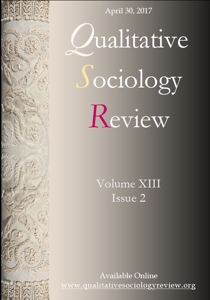Power and Resistance: Homeless Men Negotiating Masculinity
DOI:
https://doi.org/10.18778/1733-8077.13.2.04Keywords:
Masculinity, Power and Resistance, Hegemonic Masculinity, Foucault, HomelessnessAbstract
Hegemonic masculinity conceptualizes power from a modernist perspective that precludes a theoretically cohesive explanation of resistance. From this perspective, men are assumed to possess the power to construct masculinity in a manner that not only maintains hegemonic dominance over women and subordinate men, but convinces these groups to be complicit in their own subordination. However, homeless men are commonly believed to be powerless and, therefore, unable to enact normative or ideal (or hegemonic) masculinity. In order to explore theoretical assumptions about power within gender relations, the present research employs a Foucauldian informed perspective on power to examine homeless men’s constructions of masculinity. The findings suggest that although the men’s attitudes and behaviors are to some degree influenced by masculinity norms, varying individual interpretations of norms and interactional specific goals are also highly influential. The men’s choices to comply or resist masculinity norms were not consistent but contextually specific. That resistance was a normative aspect of the men’s construction of masculinities suggests that a Foucauldian informed perspective on power relations may more accurately capture the complexities of the construction of masculinities, and the co-constitutive nature of power relations in general.
Downloads
References
Archer, John. 1994. Male Violence. London: Routledge.
Google Scholar
Barrow, Susan M. and Nicole D. Laborde. 2008. “Invisible Mothers: Parenting by Homeless Women Separated from Their Children.” Gender Issues 25(3):157-172.
Google Scholar
DOI: https://doi.org/10.1007/s12147-008-9058-4
Beasley, Chris. 2013. “Problematizing Contemporary Men/Masculinities Theorizing: The Contribution of Raewyn Connell and Conceptual-Terminological Tensions Today.” The British Journal of Sociology 63(4):747-765.
Google Scholar
DOI: https://doi.org/10.1111/j.1468-4446.2012.01435.x
Bharel, Monica, Carolyn Casey, and Eve Wittenberg. 2009. “Disparities in Cancer Screening: Acceptance of Pap Smears among Homeless Women.” Journal of Women’s Health 18(12):2011-2016.
Google Scholar
DOI: https://doi.org/10.1089/jwh.2008.1111
Bowker, Lee H. 1998. Masculinities and Violence. Thousand Oaks, CA: Sage.
Google Scholar
DOI: https://doi.org/10.4135/9781483328010
Bruns, Gerald L. 2005. “Foucault’s Modernism.” Pp. 348-378 in The Cambridge Companion to Foucault, 2nd edition, edited by G. Gutting. New York: Cambridge University Press.
Google Scholar
DOI: https://doi.org/10.1017/CCOL0521840821.013
Burt, Martha R. and Barbara E. Cohen. 1989. “Differences among Homeless Single Women, Women with Children, and Single Men.” Social Problems 36(5):508-524.
Google Scholar
DOI: https://doi.org/10.2307/3096815
Connell, Raewyn. 1987. Gender and Power: Society, the Person and Sexual Politics. Sydney: Allen and Unwin.
Google Scholar
Connell, Raewyn. 1995. Masculinities. Berkeley, CA: University of California Press.
Google Scholar
Connell, Raewyn and James W. Messerschmidt. 2005. “Hegemonic Masculinity: Rethinking the Concept.” Gender & Society 19(6):829-859.
Google Scholar
DOI: https://doi.org/10.1177/0891243205278639
Deveaux, Monique. 1994. “Feminism and Empowerment: A Critical Reading of Foucault.” Feminist Studies 20:223-247.
Google Scholar
DOI: https://doi.org/10.2307/3178151
Di Leonardo, Micaela. 1991. Gender at the Crossroads of Knowledge: Feminist Anthropology in the Postmodern Era. Oakland, CA: University of California Press.
Google Scholar
DOI: https://doi.org/10.1525/9780520910355
Foucault, Michel. 1977. Discipline and Punish: The Birth of the Prison. New York: Pantheon.
Google Scholar
Foucault, Michel. 1980. Power/Knowledge: Selected Interviews and Other Writings 1972–1977. London: Harvester Press.
Google Scholar
Foucault, Michel. 1994. Power. New York: The New Press.
Google Scholar
Hartsock, Nancy. 1990. “Foucault on Power: A Theory for Women?” Pp. 15-33 in Feminism/Postmodernism, edited by L. J. Nicholson. New York: Routledge.
Google Scholar
Kimmel, Michael S. 1987. “The Cult of Masculinity: American Social Character and the Legacy of the Cowboy.” Pp. 235-249 in Beyond Patriarchy: Essays by Men on Pleasure, Power, and Change, edited by M. Kaufman. Toronto: Oxford University Press.
Google Scholar
Kimmel, Michael S. 1994. “Masculinity as Homophobia: Fear, Shame, and Silence in the Construction of Gender Identity.” Pp. 119-141 in Theorizing Masculinities, edited by H. Brod and M. Kaufman. Thousand Oaks, CA: Sage.
Google Scholar
DOI: https://doi.org/10.4135/9781452243627.n7
Little, Jo and Michael Leyshon. 2003. “Embodied Rural Geographies: Developing Research Agendas.” Progress in Human Geography 27(3):257-272.
Google Scholar
DOI: https://doi.org/10.1191/0309132503ph427oa
Lorentzen, Jeanne M. 2008. “‘I Know My Own Body’: Power and Resistance in Women’s Experiences of Medical Interactions.” Body & Society 14:49-84.
Google Scholar
DOI: https://doi.org/10.1177/1357034X08093572
MacLeod, Catriona and Kevin Durrheim. 2002. “Foucauldian Feminism: The Implications of Governmentality.” Journal for the Theory of Social Behavior 32(1):41-60.
Google Scholar
DOI: https://doi.org/10.1111/1468-5914.00175
Meanwell, Emily. 2012. “Experiencing Homelessness: A Review of the Recent Literature.” Sociology Compass 6:72-85.
Google Scholar
DOI: https://doi.org/10.1111/j.1751-9020.2011.00432.x
Miller, Toby. 1989. “Commodifying the Male Body, Problematizing ‘Hegemonic Masculinity?’” Journal of Sport and Social Issues 22:431-446.
Google Scholar
DOI: https://doi.org/10.1177/019372398022004007
Nonn, Timothy. 1995. “Hitting Bottom: Homelessness, Poverty and Masculinities.” Theology and Sexuality 2:11-26.
Google Scholar
DOI: https://doi.org/10.1177/135583589500200302
Passaro, Joanne. 1996. The Unequal Homeless: Men on the Streets, Women in Their Place. New York: Routledge.
Google Scholar
Pringle, Richard. 2012. “Masculinities, Sport, and Power: A Critical Comparison of Gramscian and Foucauldian Inspired Theoretical Tools.” Journal of Sport and Social Issues 29(3):256-278.
Google Scholar
DOI: https://doi.org/10.1177/0193723505276228
Sawicki, Jana. 1998. “Feminism, Foucault, and ‘Subjects’ of Power and Freedom.” Pp. 93-107 in The Later Foucault: Politics and Philosophy, edited by J. Moss. London: Sage.
Google Scholar
U.S. Census Bureau. 2000. American Factfinder Fact Sheet: Alger, Baraga, Chippewa, Delta, Dickinson, Gogebic, Houghton, Iron, Keweenaw, Luce, Marquette, Menominee, Ontonagon and Schoolcraft, MI Counties. Retrieved February 11, 2013: http://factfinder.census.gov/servlet
Google Scholar
U.S. Dept. of Housing and Urban Development. 2010. Annual Homeless Assessment Report, June 2010. Retrieved February 11, 2013: http://www.huduser.org/portal/publications/povsoc/ahar_5.html
Google Scholar
Wartenberg, Thomas E. 1990. The Forms of Power: From Domination to Transformation. Philadelphia, PA: Temple University Press.
Google Scholar
Wesely, Jennifer K. 2009. ‘“Mom Said We Had a Money Maker’: Sexualization and Survival Contexts among Homeless Women.” Symbolic Interaction 32(2):91-105.
Google Scholar
DOI: https://doi.org/10.1525/si.2009.32.2.91
Whitehead, Stephen M. 2002. Men and Masculinities: Key Themes and New Directions. Cambridge: Polity Press.
Google Scholar
Downloads
Published
How to Cite
Issue
Section
License

This work is licensed under a Creative Commons Attribution-NonCommercial-NoDerivatives 4.0 International License.











